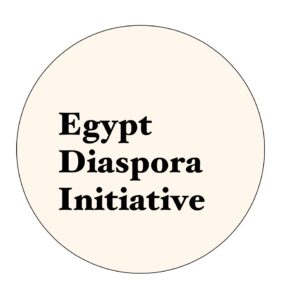
Nadine Loza is a development strategist, opinion columnist, speechwriter and Founding Director of the Egypt Diaspora Initiative. With her gentle soul and powerful mind, she is hailed as one to watch on the international scene. We caught up with her to find out more about her impressive organization.
Can you please tell us about the Egypt Diaspora Initiative and what led you to create it?
The Egypt Diaspora Initiative (EDI) is an independent and inclusive virtual gathering of Egyptian migrants globally. I founded the EDI in February 2017 because I felt Egyptians abroad lacked a neutral space where we could all come together to share our experiences and express our concerns.
As I grew up living in the USA, Poland, Greece and Portugal and travelling extensively, it became apparent to me that larger groups of Egyptian migrants would only mainly assemble at demonstrations, the private events of associations and businesses and in places of worship – all of which are prone to producing echo chambers (particularly in their online manifestations) and thus not generally conducive to fair, pragmatic, broad-ranging dialogue.
The raison d’être of the EDI is to mend, in however minor a manner, this fragmentation. Our main objective is to establish a close link between Egyptian communities all over the world and Egypt, cutting across political and religious affiliation, age and gender, and free of commercial interests. By not only providing clear, concise consular and electoral information but also raising issues of interest and serving as a forum for debate and network of support, the EDI works to engage the diaspora in fresh, alternative ways.
How did your initiative initially grow and why did you decide to set it up on social media?
I chose to base the initiative on Instagram rather than a standalone website because it is a popular, interactive, user-friendly platform that is well-suited to the EDI’s tone and message. As I am a 2015 International Development Studies and World Cinemas graduate of McGill University, I first told my fellow alumni about it. News of the page then spread to the Egyptian student associations of other North American universities and eventually to Egyptian communities elsewhere. Reaching 20,000 by August 2017, the EDI has today amassed over 45,000 members of all ages and backgrounds united by a common connection to our homeland.
Do you address your vast following in a style that acknowledges their heterogeneity?
Being mindful of diversity has been a priority for me from the outset. It may seem grammatically flawed that the ‘E’ of EDI stands for ‘Egypt’ and not ‘Egyptian’ but this was a deliberate decision taken after careful consideration. I neither wished to predicate, prerequire, presume nor project any one nationality onto anyone. Some diasporans no longer hold Egyptian citizenship while some never did; some view themselves as ‘hyphenated Egyptians’ and some do not identify as Egyptian at all.
Paying attention to the subtleties of diction can make a big difference in ensuring people feel seen and accepted. For this reason, I do not endorse using the term ‘expatriate’ to describe our emigrant population due to its historical connotations of exile and any appearance of it in my newspaper articles has been a result of the publication’s editorial preference.
I began incorporating Arabic translations to each EDI post within one month of starting the initiative to accommodate migrants for whom English is a second language and pronouns are kept gender inclusive in both the English and Arabic texts.

How has the Egypt Diaspora Initiative adapted in light of COVID-19?
The initiative is always quick to aid migrants in need of assistance and answers and we also try our best to uplift those who reach out feeling homesick and seeking moral support.
We have strived to remain as active and helpful as possible during these surreal, challenging times. We responded to logistical queries from Egyptians stranded abroad as air travel shut down in March, pointing them to the relevant resources and contacts in cases beyond our purview.
In April, the EDI signed the International Organisation for Migration (IOM)’s ‘Joint Statement in Solidarity with those Facing Xenophobia due to COVID-19’ which affirms that everyone should be protected from prejudice no matter where in the world they find themselves during this pandemic or what their legal status is.
As follow up, I joined the signatories in convening to form a global coalition of diaspora leaders from over 150 countries and we participate in virtual exchange sessions to find collaborative solutions to regional COVID-19 effects and coordinate the safeguarding of vulnerable communities.

Would you please offer some advice to diaspora organizations on how they can successfully rally their respective diasporas to positively impact development?
Reading about the commendable endeavours undertaken by other diaspora organisers and showcased through the pioneering, tireless efforts of Diaspora Digital News has expanded my knowledge, inspired me and confirmed to me that I still have a lot to learn. Despite this, I will share some of the considerations that have guided my work on the EDI so far in the hope they may benefit an emerging wave of networks.
1. Understanding diasporic divisions
In addition to typical societal faultlines, migrants contend with other tensions based on the path they took to arrive at the host country, the phase of the migratory journey they are in, whether they are abroad permanently or temporarily, where they are originally from in the home country and whether they settled earlier or are relative newcomers.
2. Finding a middle ground
Balance and patience are essential if you are to unite different communities and engage migrants who may be disenchanted and underserved by official channels.
3. Speaking out for what’s right and advocating for more rights
Raise awareness about matters that affect the diaspora, find ways to further extend the benefits of citizenship to those abroad and increase the visibility of migrants in the elections of their country of origin and country of residence.
Now more than ever, as the pandemic causes severe dips in the economic remittances many sending nations rely heavily upon, we must once and for all dispel the damaging notion that investments and monetary flows are the only valid or valuable input emigrants have to offer. To focus exclusively on the financial is to overburden migrants and overlook the equally important role of social remittances. Appreciating the voices of diasporans and harnessing the potential of social, cultural, political, scientific and technological contributions is key to furthering development.

For more information, follow The Egypt Diaspora Initiative (EDI) here: https://www.instagram.com/egyptdiasporainitiative/
Images by: Nadine Loza
Share this:
Subscribe to our newsletter!

RELATED STORIES



